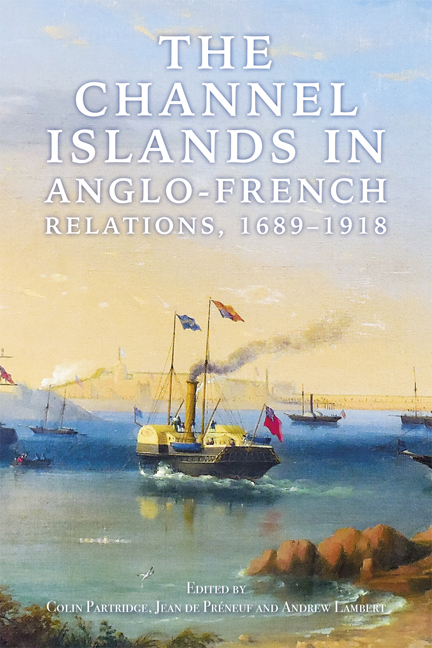Book contents
- Frontmatter
- Dedication
- Contents
- List of Illustrations
- List of Contributors
- Preface
- Introduction: ‘The Ehrenbreitstein of the English Channel’
- Part 1 Corsairs – the Ancien Régime and French Wars from 1689
- Part 2 The Islands – French and British Intelligence from the Seven Years War to 1815
- Part 3 Territorial Waters – the Land and Sea Interface from the 17th to 20th Centuries
- Part 4 Engineering Strategic Change
- Part 5 Alderney and the Channel Islands – Naval Strategy from 1815 to 1905
- Part 6 Civil Societies and Anglo-French Naval Rivalry – the 19th Century to WWI
- Part 7 Trade War – the Protection of Channel Islands Shipping in the Great War
- Afterword: Alderney, The Channel Islands, and the Study of History
- Bibliography
- Index
4 - Channel Islands Territorialisation: A Challenge Between Local, National, and International Law (XVII°−XIX°)
Published online by Cambridge University Press: 15 May 2024
- Frontmatter
- Dedication
- Contents
- List of Illustrations
- List of Contributors
- Preface
- Introduction: ‘The Ehrenbreitstein of the English Channel’
- Part 1 Corsairs – the Ancien Régime and French Wars from 1689
- Part 2 The Islands – French and British Intelligence from the Seven Years War to 1815
- Part 3 Territorial Waters – the Land and Sea Interface from the 17th to 20th Centuries
- Part 4 Engineering Strategic Change
- Part 5 Alderney and the Channel Islands – Naval Strategy from 1815 to 1905
- Part 6 Civil Societies and Anglo-French Naval Rivalry – the 19th Century to WWI
- Part 7 Trade War – the Protection of Channel Islands Shipping in the Great War
- Afterword: Alderney, The Channel Islands, and the Study of History
- Bibliography
- Index
Summary
On 23 July 2019, the territorial waters of the Bailiwick of Guernsey (Guernsey, Alderney and Sark) were increased from 3 to 12 nautical miles (‘nm’). This unilateral decision taken by the Bailiwick of Guernsey1 came after the United Kingdom extended its territorial waters from 3 to 12nm in 1987, the Isle of Man in 1991 and Jersey in 1997. However, the maritime boundaries between the Bailiwick of Guernsey and France are still to be agreed. Indeed, the lines to the south-west and east of the Bailiwick were defined in the 1992 Schole Bank Agreement, but only for fishing purposes.
This decision is linked to the potential impact of Brexit on fishing for the Channel Islands, in order for the Bailiwick to be able to control and monitor fishing in its surrounding seas more efficiently than if they were not territorial waters. It does not only imply opening negotiations with France regarding the maritime boundaries between Normandy, Brittany and the Bailiwick, but also raises questions as to free navigation between the Islands of the Bailiwick, more particularly by French navy ships.
On Jersey's side, things are not necessarily simpler, but they were at least agreed between the Bailiwick of Jersey and France. In 2004, the Bay of Granville Treaty between France and the United Kingdom (4 July 2000) entered into force to:
(i) define the maritime boundaries between Jersey and France, and
(ii) set the fishing rights of French and Jersey (but also Guernsey …) fishermen.
It should be noted however that the treaty maintains a disconnection between territorial waters and the definition of fishing zones. The 2000 treaty is the latest in a long history of negotiations between Jersey and France regarding fishing rights in the Bay of Granville. It came back to the ‘oyster war’ that occurred at the beginning of the 19th century, which will be discussed later.
These two very recent examples show the complexity and fragmentation of the sea for economic and political reasons. It also demonstrates the complexity of dividing the sea in the Channel Islands area, given the particularities of the Islands’ status in international law.
- Type
- Chapter
- Information
- The Channel Islands in Anglo-French Relations, 1689-1918 , pp. 75 - 87Publisher: Boydell & BrewerPrint publication year: 2024



